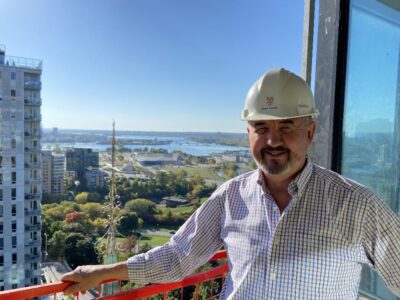As The Vista on Sparks, the new 18-storey retirement residence on the east side of the Christ Church Cathedral, officially opened and began welcoming tenants in November, the cathedral parish and the Anglican Diocese of Ottawa celebrated the completion of a vital project first envisioned almost 20 years ago.

Gwen Lévesque, chair of the board of the Cathedral Hill Foundation (CHF), which was established in 2010 to represent the Cathedral and the Diocese in this project, told Crosstalk that the objective “was to provide a secure revenue stream for the church’s many important social ministries and to ensure that there is ongoing revenue to maintain its important heritage buildings without compromising its ministries.” She added that members of the foundation “have been resolute in their determination” to realize that goal, and “and also to ensure that in doing so these buildings which bracket Ascension House and the Cathedral would be a good fit for the neighbourhood. There is a great deal of satisfaction in accomplishing these results.”
David Morgan, who has been a member of the cathedral parish for 43 years and has been a CHF board member from its beginnings, described the challenges that first sparked this dream. A second cathedral hall built in 1950 “was 30 or 40 feet high inside with a stage at one end and a mezzanine balcony at the other end which we no longer really used. You had to heat all that before you got the heat down to where people were actually standing. The roof leaked. It was inappropriate in terms of architecture,” and he added they needed more space for the girls’ choir, which was just being established. “There were all kinds of reasons why we felt the need to remove that hall,” he said.
The cost of building a new hall, however, was beyond the Cathedral’s capacity. “We thought we would try and offer it up as a development parcel and get a hall that way… but it very soon became apparent that it was too small a parcel to be successfully developed and to give us back all the wonderful things that we wanted,” he said.

The Cathedral turned to the Diocese, which also owned parts of the block, but the situation was complicated by the fact that the Cathedral and Diocese each owned bits and pieces, like a patchwork quilt on the 40,000 square foot area. Rather miraculously, Morgan said, it turned out that when you added all the bits up about half was owned by each party. “So, we had a very quick and short meeting with the Diocese where it was agreed that we could go into a joint venture on this, and everything would be split 50-50.”
Initially, representatives from both the Diocese and the Cathedral formed a joint development group, working out the details according to the Canons, Bylaws and Regulations (CBRs) and holding bidding processes with the proviso that payments would come from the development, and the parties involved had to be willing to wait for that. “We selected Gowlings. They had a very good commercial real estate partnership, and Windmill Developments, who basically knocked it out of the park above all the other proposals in terms of being willing to work with the church and understanding the church’s motivations to be doing this,” Morgan said.
The group did discuss the possibilities of including affordable housing as a part of the development, but in the end, Morgan said they decided that it was more beneficial to get the maximum return from properties in this prominent location in the city and then use those revenues to benefit community ministries in the diocese.
Windmill was contracted to develop the property in two phases. The first phase was a residential condominium tower to be built on the west side of the cathedral next to Ascension House, with a commercial building to be built later. At that point, the joint venture group was formalized as the non-profit Cathedral Hill Foundation, and it was chaired first by David Caulfield, then David Morgan, and by Barbara Gagne, who led the board until she stepped down in 2020 and was succeeded by Lévesque. The ownership of the land was transferred to the CHF, so that the developer was only dealing with one entity representing both the Cathedral and the Diocese.

Bishop Shane served as the dean and rector of the Cathedral from the beginning of the development and was instrumental throughout, supporting volunteers on the joint venture committee and being the face of the development project to outside parties. He recalls making a representation to the City of Ottawa, persuading planning authorities to rezone the land so the project could proceed. “I had to explain that, while we were responsible for a municipal “heritage asset” called Christ Church Cathedral, we were in a self-defeating circle where spending money to keep the building in good repair meant no money for all the good things we offer to the city, which meant diminishing givings. We needed to develop our property to pay for our property. Fortunately, we prevailed.”
A large-scale construction project inevitably comes with disruptions of various kinds, but Morgan says that overall members of the cathedral parish were supportive. “It helped to meet often with them in special vestry meetings and other sessions when the developer would explain the plans….We kept up a pretty steady and consistent communication,” he said. The loss of parking spots was the biggest inconvenience, for which there was $30,000 annual compensation during the construction. The first phase included 25 underground parking spots when it was finished, also split between the Cathedral and Diocese.
The 21-storey, 140-unit condominium tower was completed in 2015. It is a 99-year ground lease, with option for another 100 years. As a part of that phase of the development, the Cathedral’s present-day Great Hall was built along with a kitchen, and revamped archives space. The area that links Lauder Hall and the Great Hall to the cathedral itself was renewed and updated. Masonry was repaired. Ascension House was also renovated and the parking spots purchased. The total cost was more than $2.5 million. The lease payment was made as a lump sum, with the costs for the Great Hall, replacements/repairs/parking spaces being paid from this revenue, and the balance invested in the Consolidated Trust Fund (CTF), Lévesque explained. Disbursements from the CTF dividends are allocated 50/50 to the Cathedral and Diocese.
After some delays and an extension of the original time frame, Windmill let the CHF know they could not do the second phase. Fortunately, the Reichmann Senior Housing Development Corporation saw it as a prime location and opportunity to build a retirement accommodation complex. Lévesque said they have been very good, professional partners. As occupancy begins, annual rent will be paid, with an escalation based on CPI changes on a 10-year review cycle, Lévesque said. Disbursements will be 50/50 between the Cathedral and Diocese. Underground parking will include: 10 spaces for the Cathedral’s exclusive use 24/7; 15 spaces from Monday to Friday from 6 pm to 6am and Saturday-Sunday 24 Hours, with five additional spaces for special events with notice given.
As is expected with construction and development, a few adjustments had to be made along the way. Most notably, the plan to make another level of underground parking had to be changed. Due to fractures in the bedrock, Reichmann said including another layer of parking would have cost them $3 million. “So, we split the difference and received $1.5 million from them in addition to the lease rent. That’s the sort of adaptability you have to have as you go along,” Lévesque explained. No project goes exactly according to plan.
Despite such hiccups and the fact that the pandemic slowed everything down, The Vista on Sparks officially opened on Oct. 21, offering 152 units including independent living as well as assisted living options. The restaurant Cooke’s-on-the-Water occupies the top floor and offers residents and their guests an expansive view of the city and river. There is also a pub, patios and many other amenities. The move-in date for the first residents was Nov. 4. Marketing manager Julia Riddick told Crosstalk that they have had lots of interest from Anglicans in the city who would like to live near the Cathedral. They expect to reach 25% occupancy by early February and 50% by the end of May 2025, she said.
Morgan said the completion of the development and an influx of hundreds of new neighbours is a good opportunity to rejuvenate the cathedral community. “We’ve got all these new facilities which are useful and that we can rent out,” mentioning the annual Ottawa International Writers Festival as an example. It will also help reach out to the community more. “We can now go to the Vista on Sparks and say, you know, we’re having a music night on Thursday, please come and Dean Beth Bretzlaff, the current rector of Christ Church Cathedral, echoed that hopeful view: “The Cathedral Hill Foundation has not only created a revenue stream but also a neighbourhood, and our Cathedral is now focusing on building community. These are gifts that will keep on giving well into the future, honouring the faithful stewardship of those who worked so hard to bring a dream to reality.”




Week of Prayer for Christian Unity annual service to be celebrated at Saint Paul University on Jan. 22